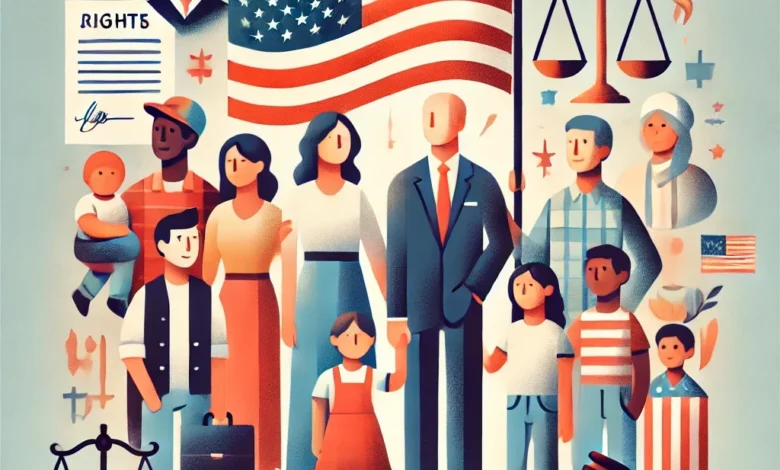Know Your Rights as Immigrant and Refugee in the U.S.

WASHINGTON, D.C. – In the United States, everyone—regardless of immigration status—has fundamental rights. These rights may differ from those in a person’s country of origin, making it essential for immigrants to be aware of their protections to better safeguard themselves and their families.
However, immigration policies and immigrant benefits may change after January 20, 2025, under a possible Donald Trump administration. Find out what to expect from Trump’s immigration policies.
Fundamental Rights for All
In the U.S., even non-citizens and undocumented individuals are entitled to basic rights, including:
- Freedom of speech and peaceful assembly
- Protection from discrimination and unfair treatment
- The right to privacy and personal security
Regardless of immigration status, everyone has the right to fair treatment. No one can discriminate against you based on your immigration status, nationality, race, religion, gender, sexual orientation, disability, or political beliefs. These protections apply in housing, workplaces, schools, healthcare facilities, and public services.
The Right to Safe Housing
Every individual has the right to live in a safe and healthy home. Landlords cannot refuse to rent to you or charge you extra because of your immigration status. You also have the right to request reasonable accommodations for a disability, and landlords are legally required to provide them.
Workplace Rights and Fair Wages
Regardless of immigration status, workers have the right to a safe and fair workplace. This includes:
- Protection from dangerous chemicals and unsafe equipment
- Receiving at least the federal or state minimum wage
- Protection from exploitation, discrimination, and unfair dismissal
Employers cannot fire, demote, or underpay you based on your immigration status. You also have the right to report unsafe working conditions without fear of retaliation.
The Right to Free Education
All children in the U.S., including undocumented immigrants, have the right to free public education. Schools cannot discriminate based on race, ethnicity, or immigration status. Every child is entitled to primary and secondary education.
Access to Emergency Healthcare
Immigrants—regardless of legal status—have the right to receive emergency medical care. Hospitals must provide treatment in life-threatening situations, even if the patient does not have insurance.
Community Safety and Police Protection
Everyone has the right to live in a safe community. If you feel threatened or are in danger, you can request help from law enforcement or emergency services.
Rights When Dealing with Police and Immigration Officials
If approached by law enforcement or immigration authorities (ICE, CBP, or police officers):
- You have the right to remain silent – You do not have to answer questions about your immigration status.
- You have the right to refuse searches – Police must have a legal warrant to search your home, car, or phone.
- You are not required to sign any documents without a lawyer present.
Family Reunification Rights
Several programs allow immigrants to apply for visas to bring family members to the U.S. These programs help reunite families legally and safely.
Legal Protections Against Deportation
If you are facing detention or deportation, you still have rights:
- The right to a fair immigration hearing before a judge
- The right to seek asylum or request deportation relief
- The right to legal counsel – While the government does not provide free attorneys for immigration cases, you can seek help from legal aid organizations
The Right to have an Interpreter
Many government services offer free translation assistance to help immigrants understand legal and administrative procedures. If you do not speak fluent English, you can request an interpreter when dealing with government agencies, hospitals, and public offices.
Public Assistance and Social Services
Some public benefits are available regardless of immigration status, including:
- Emergency food assistance
- Temporary housing assistance
- Legal aid services
Travel Rights
You have the right to travel freely within the U.S., but international travel may require proper documentation. If you plan to leave the country, check whether your immigration status allows re-entry.
Applying for Immigration Benefits
Immigrants can apply for legal status through programs like:
- Work permits
- Green cards (permanent residency)
- U.S. citizenship (for eligible applicants)
Protections for Victims of Domestic Violence
If you or someone you know is a victim of domestic violence, you have the right to seek legal protection and shelter services. Special visas, such as the VAWA Visa (Violence Against Women Act), are available for victims facing abuse.
Rights Based on Immigration Status
Different immigrant groups have distinct legal rights:
- Undocumented immigrants – While they lack legal residency, they still have basic protections, including workplace rights, emergency medical care, and legal defense against discrimination.
- Stateless individuals – Those without recognized citizenship in any country can still access certain legal protections and public services in the U.S.
- Refugees and asylum seekers – Individuals granted asylum or refugee status can receive public benefits, healthcare, financial assistance, and work permits. After one year, they can apply for a Green Card.
- U.S. Citizens – Immigrants who obtain U.S. citizenship enjoy full legal rights, including the right to vote and hold public office.
Rights for Immigrant Children
Children, even if undocumented, have special protections, including:
- The right to free education
- Protection from abuse and neglect
- Legal safeguards against family separation
Family and Spousal Rights
Immigrants can apply for family reunification visas, allowing spouses, children, and parents to join them in the U.S. Victims of domestic violence may also be eligible for special immigration protections.
Education and Legal Resources for Immigrants
- Free English language classes (ESL programs)
- Low-cost or free legal consultation services
Protection Against Discrimination
- Equal treatment in the workplace – Employers cannot discriminate against employees based on their immigration status, race, religion, or gender.
- Equal access to healthcare and housing – Immigrants have the right to access essential services without discrimination.
Conclusion
Immigrants in the U.S. have fundamental rights, regardless of their legal status. Knowing these rights can help protect individuals from discrimination, exploitation, and legal threats. For those in need of legal support, numerous organizations provide assistance to help immigrants navigate their rights and seek legal protections.
This article is based on resources from HelloAmerica, with additional insights added by the author.



